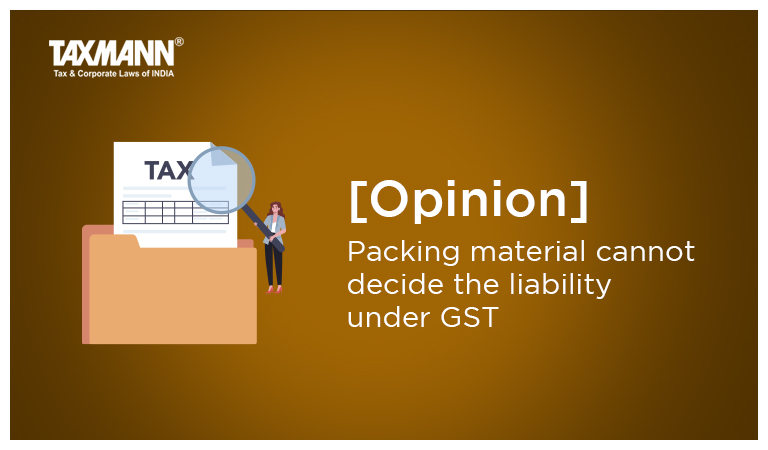[Opinion] Packing material cannot decide the liability under GST
- Blog|News|GST & Customs|
- 2 Min Read
- By Taxmann
- |
- Last Updated on 28 July, 2022

S.V.S. Raghavendra Rao & S.V.S.N. Sasidhar Rao – [2022] 140 taxmann.com 549 (Article)
Background: GST Levy on exempted goods, if supplied pre-packed:
New amendments under GST with effect from 18-07-2022 vide Notification No.7/2022-Central Tax(Rate) Dt. 13/07/2022
The Central Government, on the recommendations of the Council, hereby makes the following further amendments in the notification of the Government of India in the Ministry of Finance(Department of Revenue), No.2/2017-Central Tax (Rate), dated the 28th June, 2017. Some of the Exempted Goods were brought into tax by adding the words to the Exempted Goods in the Notification 2/2017- “other than pre-packaged and labelled”.
For Example: Curd, Lassi and Butter Milk under HSN 0403 were exempted vide S. No. Number 26 of Notification 2/2017 Dt 28-07-2017. Now by insertion of new condition “other than pre-packaged and labelled” through Notification 7/2022, the goods which were already exempted under Notification No 2/2017 became taxable with effect from 18-07-2017. And the same goods continue to be exempted under GST, if sold without any pre-package and label.
Supply of goods with packing material is a composite supply
Under Section 2(30) of GST- “composite supply” means a supply made by a taxable person to a recipient consisting of two or more “taxable supplies” of goods or services or both, or any combination thereof, which are naturally bundled and supplied in conjunction with each other in the ordinary course of business, one of which is a principal supply;
Illustration: Where goods are packed and transported with insurance, the supply of goods, packing materials, transport and insurance is a composite supply and supply of goods is a principal supply;
And under Section 8 of GST,
“the tax liability on a composite or a mixed supply shall be determined in the following manner, namely: (a) a composite supply comprising two or more supplies, one of which is a principal supply, “shall be treated as a supply of such principal supply;”
And Sec 2 (90) of GST “principal supply” means the supply of goods or services which constitutes the predominant element of a composite supply and to which any other supply forming part of that composite supply is ancillary;
Therefore, as per section 8, every supply of goods with packing material is a Composite Supply and the Principal Supply is GOODS. Hence the pre-packed exempted goods are not liable to tax based on principal supply.
Supportive example for composite supply under the same law – Renting of goods carriage.
Notification No.03/2022-CentralTax(Rate) New Delhi,the13thJuly 2022
(V) againstserialnumber10,incolumn(3),- after item(i) and the corresponding entries relating the reto in columns(4)and(5), the following shall be inserted, namely: –
| (3) | (4) | (5) |
| “(ia) Renting of goods carriage where the cost of fuel is included in the consideration charged from the service recipient. | 6 | -“; |
As per the above Entry, if the owner of Goods carriage given his vehicle to a recipient on rent, he has to pay tax @ 6 % on total consideration charged including cost of fuel, even Fuel like Diesel is out of GST. Thus, the levy is based on composite supply with the combination of two or more supplies naturally bundled with each other.
Click Here To Read The Full Article
Disclaimer: The content/information published on the website is only for general information of the user and shall not be construed as legal advice. While the Taxmann has exercised reasonable efforts to ensure the veracity of information/content published, Taxmann shall be under no liability in any manner whatsoever for incorrect information, if any.

Taxmann Publications has a dedicated in-house Research & Editorial Team. This team consists of a team of Chartered Accountants, Company Secretaries, and Lawyers. This team works under the guidance and supervision of editor-in-chief Mr Rakesh Bhargava.
The Research and Editorial Team is responsible for developing reliable and accurate content for the readers. The team follows the six-sigma approach to achieve the benchmark of zero error in its publications and research platforms. The team ensures that the following publication guidelines are thoroughly followed while developing the content:
- The statutory material is obtained only from the authorized and reliable sources
- All the latest developments in the judicial and legislative fields are covered
- Prepare the analytical write-ups on current, controversial, and important issues to help the readers to understand the concept and its implications
- Every content published by Taxmann is complete, accurate and lucid
- All evidence-based statements are supported with proper reference to Section, Circular No., Notification No. or citations
- The golden rules of grammar, style and consistency are thoroughly followed
- Font and size that’s easy to read and remain consistent across all imprint and digital publications are applied



 CA | CS | CMA
CA | CS | CMA
